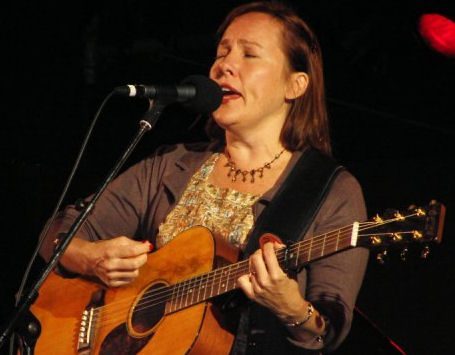IRIS DEMENT IN CONCERT
Iris DeMent in Concert
The Smothers Theatre, Pepperdine University, Malibu, CA – September 29, 2016
The Best Singer Merle Haggard Ever Heard
 The youngest of 14 children, Iris DeMent must have had to yell a little louder to be heard above her older brothers and sisters growing up in the Arkansas Delta. Those early childhood needs evolved into what Merle Haggard called “The best singer I’ve ever heard” when he invited her to join his touring band upon the release of her first album Infamous Angel in 1992. She returns the tribute by opening with one of his lesser known songs at the keyboard of a grand piano—where she spends the entire evening playing and serenading the grateful audience at the Smothers Theatre at Pepperdine University with her two piece band on upright bass and pedal steel guitar. She also pays tribute to “The First Lady of Country Music,” in whose shoes she is proud to walk, Tammy Wynette.
The youngest of 14 children, Iris DeMent must have had to yell a little louder to be heard above her older brothers and sisters growing up in the Arkansas Delta. Those early childhood needs evolved into what Merle Haggard called “The best singer I’ve ever heard” when he invited her to join his touring band upon the release of her first album Infamous Angel in 1992. She returns the tribute by opening with one of his lesser known songs at the keyboard of a grand piano—where she spends the entire evening playing and serenading the grateful audience at the Smothers Theatre at Pepperdine University with her two piece band on upright bass and pedal steel guitar. She also pays tribute to “The First Lady of Country Music,” in whose shoes she is proud to walk, Tammy Wynette.
Iris DeMent’s instantly recognizable voice is a force of nature, and her piano playing comes out of the Pentecostal Church tradition in which she grew up—having elements of both the sacred and profane indeterminately mixed that at times almost overwhelm her shake the roof to the rafters voice—that like Superman’s eyes, could pierce through lead. It was something to see—and hear—especially so in that her speaking voice is perfectly normal—almost lilting and at times laughing—until she starts to sing. Then you are quickly in another dimension. It evoked comparisons to me with the bedrock of all singers—the one whom no one on earth can touch—Janis Joplin. But just to be in the same sentence with Janis is a singular achievement; and where Iris belongs. The two standing ovations she earned at the end of the show were spontaneous and heartfelt.
https://www.youtube.com/watch?v=D0EcJFVEg5I
Her songs go straight to the heart; nothing cloudy or mushy—unsentimental—but heart-stopping nonetheless. My two favorites were Jill Fenimore’s favorites as well, including one in the main part of the concert, and one encore. The early song had echoes of a classic poem by Edna St. Vincent Millay—Ballad of the Harp-Weaver—about her mother. It starts out simply describing the worn head scarf her mother wore, and then goes on to paint a picture of the beautiful bonnet she wove for her child Iris. Her mother lived to be 93—and Iris cared for her in her final years—when she wrote this glorious song, called You Don’t Have to Worry, I Won’t Ask You Why. As someone who did the same for my mother when she developed Alzheimer’s, I can attest to the fact that the very memories she was losing brought back some of my own, and Iris DeMent could not have evoked her own mother’s legacy in a more moving way.
The encore song (our second favorite) was called My Life—and is perhaps the best antidote for depression I have ever heard in the form of a song. After lamenting the fact that life is impermanent, that we are all transient creatures who—in the throes of her depression—are doomed not even to be recalled after we are gone—DeMent looks for some signs of hope in this very transience—some redemptive quality to make life worthwhile even if it is forgotten. And—uncannily for someone who grew up a devout Christian in the family of a Pentecostal preacher—the Holy Roller church where they speak in tongues—and who now describes herself as an agnostic—Iris finds it not in the hereafter, but in the here and now. It’s a secular hymn, thematically akin to Phil Ochs’ When I’m Gone. DeMent ends another of her resolutely in praise of this world songs with a biting remark to those who are waiting for Kingdom Come: “The Kingdom has already come.” Two more songs worth noting are a lovely elegy she wrote for her late brother, and one for her Arkansas home, Singing the Delta. DeMent is an artist who remembers where she came from, including the Christian church in which she was raised. Their beliefs may no longer be central to her life, but their music has sustained her throughout.
The heart of the concert, however, excavated a far-distant territory in her mental landscape—song poems from her newest album The Trackless Woods—a group of 18 poems by Russian dissident poet Anna Akhmatova—drawn from the thousands of poems she left behind. A friend gave DeMent a book of these poems and she kept them on her piano bench for a full two years before getting the nerve to open them up. The book fell open to a poem called “Like a White Stone,” and DeMent fell in love with it. She set it to music, and went on from there—and kept going until she reached 18 poems that she could now sing. For one of them she even echoed a tune by Johnny Cash. Somewhere before this all started she had already made a commitment to Russia, because she and her husband adopted a six-year old girl who was born in Siberia—“The hardest thing I have ever done,” she told us. The book of poems was presented to her by a loving friend as much as a gift for her daughter as for her, so one day she would be able to read them too.
DeMent introduced them by saying they were written during the mid-20th Century (Akhmatova lived from 1889 to 1966) and the poet lost a number of friends to Stalin’s various purges. These included—I would add—the “Night of Murdered Poets” when seven Russian Jewish dissident poets were slaughtered in one craven night near the end of Stalin’s life, poets like Itzik Feffer, who could only publish their own works outside the Soviet literary system—self-publishing. I wrote a song for them called Samizdat—their word for “self-publishing,” which was brilliantly summarized by Vladimir Bukovsky: “Samizdat: I write it myself, edit it myself, censor it myself, publish it myself, distribute it myself, and spend jail time for it myself.”
It was quite a moving surprise to hear one of their indelible voices transformed into modern songs by this country singer-songwriter at the top of her game—Stalin killed so many of them, but he couldn’t still their voices—the revenge of the damned. Bravo Iris DeMent, for rescuing them from the dustbin of history.
Her three great forebears, Merle Haggard, Tammy Wynette and Johnny Cash would have been thrilled. Iris DeMent is carrying on a great tradition—and keeping many departed voices alive—including a brave Russian poet of dissent. Thank you, Iris DeMent!
Ross Altman will appear at FolkWorks upcoming Folk/Roots Festival in the evening concert, Saturday October 8 at the Santa Monica Bay Women’s Club, 1210 4th St, Santa Monica, CA 90401. See www.folkworks.org for details and tickets.
Saturday October 29 at 2:00pm at the Allendale Branch Library, 1130 S. Marengo Ave. Pasadena, CA 91106 Ross Altman performs his show Ten Songs That Shook the World, originally presented at the Autry Museum of Western Heritage in 1999. 626-744-7260. Free and open to the public.
Los Angeles folk singer Ross Altman has a PhD in Modern Literature from the State University of New York at Binghamton; Ross may be reached at greygoosemusic@aol.com













